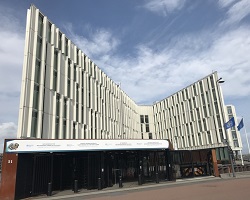Europe reviews decade of public health progress, and plans for the future at WHO annual meeting

WHO
For more information please contact:
Liuba Negru
Communications and Media Relations Officer
Tel.: +45 45 33 67 89
Mobile: +45 20 45 92 74
Email: negruL@who.int
Press release
Copenhagen, 16 September 2019
Over 500 high-level representatives, including many health ministers from the 53 Member States of the WHO European Region, will review 10 years of public health progress, address remaining and new challenges and nominate a new Regional Director at the 69th session of the WHO Regional Committee for Europe in Copenhagen, Denmark, on 16–19 September 2019. Together with partners and civil society representatives, they will mark the achievements of Health 2020, the European policy for health and well-being that has driven the Region’s efforts on health towards sustainable development.
“We are at a turning point in the health status of the European Region marked by the completion of Health 2020. As we enter a new health decade, we can look back with pride at the progress achieved together, with longer and healthier life expectancy as significant impacts,” says Dr Zsuzsanna Jakab, WHO Regional Director for Europe.
Taking stock of Health 2020’s legacy
Health 2020 has been a forerunner of 2030’s Sustainable Development Goals, focusing on issues such as the right to health, universal health coverage, social determinants, equity, people-centred systems, well-being and resilience.
The last European Health Report acknowledges that a great deal has been achieved since Health 2020 was adopted in 2012. The proportion of countries in the Region with a comprehensive national health plan aligned with Health 2020 increased from 36.4% in 2010 to 62.7% in six years. This resulted in an increase in life expectancy and reductions in premature mortality. At the same time, smoking, alcohol, overweight and obesity, and under-vaccination are still hindering progress in some countries.
“It is now time to fast-track our successes and address the remaining challenges that still hold back the most vulnerable from attaining their full health potential,” adds Dr Jakab.
Tackling the challenges ahead
The first ever WHO report on health inequities alarmingly records unchanged or worsening gaps across the Region. A central theme at the Regional Committee, the study also provides the recipe to reverse these trends within the lifetime of a national government.
A recent survey found that nearly half of all adults in eight European countries have inadequate health literacy skills. For the first time, a resolution on health literacy will be proposed for endorsement by European countries to improve people’s ability to make healthy choices throughout their life.
Another resolution will concern primary health care, which is at the root of universal health coverage. People-centred health systems, a skilled and empowered health workforce, participatory decision-making with patients, and innovation and digitalization are key to accelerating the delivery of health services at the community level.
Preparing for the challenges ahead, implementation of WHO’s transformation process will be central to the Regional Committee’s debate around an efficient Organization that can better serve its Member States and the people of the Region. This is in line with the way WHO maximizes health impacts by putting countries at the centre of its work.
The Regional Committee will also provide input to several global initiatives and strategies, including accelerating cervical cancer elimination, advancing tuberculosis research and innovation, and establishing the Decade of Healthy Ageing 2020–2030.
Keynote speeches and election of new Regional Director
Her Royal Highness, The Crown Princess of Denmark; WHO Director-General, Dr Tedros Adhanom Ghebreyesus; and Anne Bucher, Director-General, European Commission, Directorate-General for Health and Food Safety, will address the Regional Committee.
The new WHO Regional Director for Europe will be elected through a secret ballot at a private meeting by representatives of Member States of the European Region on Tuesday 17 September. The Regional Director-elect will be selected from a list of six candidates proposed by Member States. He or she will serve a five-year term, with the possibility of a second term. Further information on the nomination process and a list of candidates is available via the links below.
The 69th session of the Regional Committee will be streamed via live webcast and covered in real-time on Twitter using the hashtag #RC69CPH.



